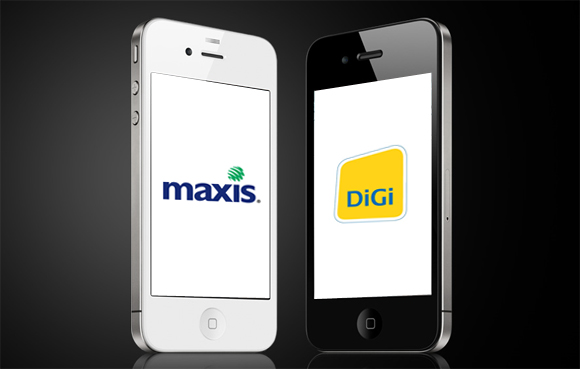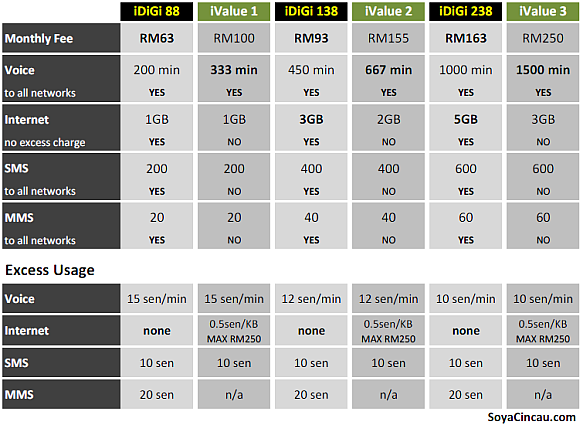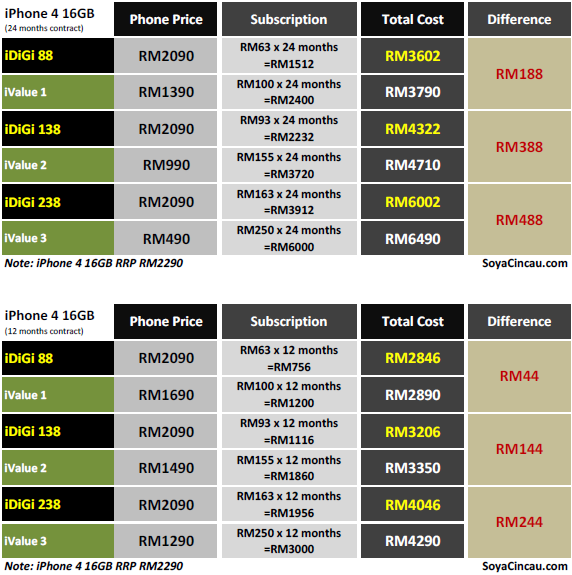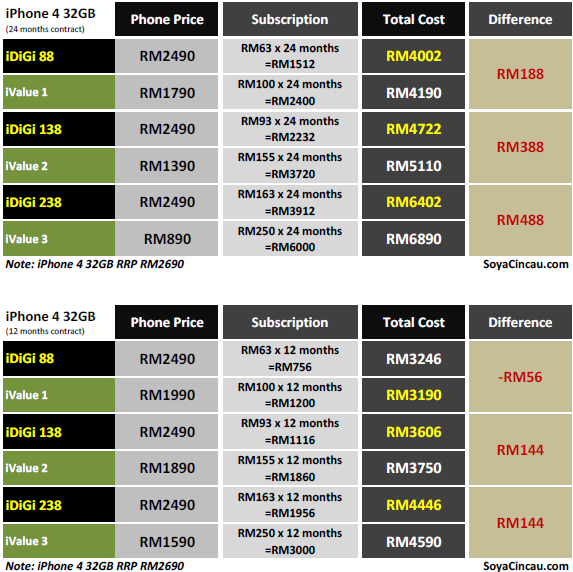
UPDATE: Added comparison for iPhone 4 32GB and 16GB for both 12/24 months contract. Please note that all DiGi’s iDiGi plans are tied to 24 months contract. The 12 months table below is for comparison only.
UPDATE 2: The iPhone 4S is launching in Malaysia on 16th December. Check out the iPhone 4S Plans from DiGi and Maxis.
UPDATE 3: iPhone 4S DiGi vs Maxis vs Celcom plans compared.
The iPhone 4 is officially available in Malaysia with both DiGi and Maxis starting from today. Both telcos are having different ways of bundling this anticipated device which could be rather challenging to compare. With the plans revealed, the biggest question now is which one is cheaper and comes with greater value?
To find out, we compared Maxis’s iValue plans with DiGi’s iDiGi plans as both had rather similar style of bundling talk time, sms, mms and data. iData is not included in the comparison as there isn’t a DiGi equivalent, plus the device is more expensive compared to its iValue offering. Just like our previous iDiGi vs iValue comparison, we list out all the bundled features for side by side comparison.
The Plans

This table looks pretty much the same as our previous comparison, but there are some minor changes. Maxis has doubled up its Internet data quota to match or to close the gap with iDiGi’s offering, however DiGi sets itself apart by offering even lower monthly fee than before. For SMS and MMS, DiGi’s bundle is applicable for all networks while Maxis is limited for Maxis to Maxis only. This means that you’ll be charged for excess use if you send to non-Maxis numbers.
Next you’ll notice that iValue offers more voice calls, up to 60% more than iDiGi. Despite that, if you calculate the price difference, DiGi is still cheaper overall.
Take for instance, iDiGi 88 and iValue 1 where iDiGi 88 is 133 minutes less. With the call rate of 15 sen/minute, the 133 extra minutes is only worth RM19.95 which makes it RM82.95 a month which is still cheaper than iValue 1’s RM100 monthly. So those who talk a lot, be rest assured that DiGi is still cheaper.
On bundled internet, the gap is more apparent on iDiGi 2 and iDiGi 3 as DiGi still offers more bundled quota than iValue 2 and 3. On the plus side, DiGi does not charge you extra if you exceed your quota while Maxis charges 0.5sen/KB until a maximum cap of RM250. If you don’t want surprises with data usage, DiGi is a better option as they would only throttle your speed until your next billing cycle without any surprise charges.
Here are some interesting things to note for the new iDiGi plans:
- Monthly subscription for iDiGi plans is RM3 more than before. Used to be RM60 for iDiGi 88, RM90 for iDiGi 138 and RM160 for iDiGi 238.
- However DiGi is giving extra RM5 monthly rebate if you opt for auto-billing. So this makes iDiGi 88 only RM58/month. Do note that this is applicable for both credit card and debit card. If you’re on a 24 months contract, that’s extra RM120 off for the whole 2 years.
If you ask us, iDiGi plans gives you more value. Our only complaint is their plan naming where the numbers doesn’t really reflect your monthly commitment but rather give a perceived “savings” from its original intended pricing.
The iPhone 4 and Total Payment
NOTE: DiGi does not offer 12 months contract, values below for reference only to illustrate total paid within 12 months of subscription.

Right, some of you had probably noticed that DiGi’s iPhone price is rather expensive compared to Maxis. We had the same thought as well as DiGi only subsidises RM200 for the device. Many would have concluded that Maxis would be cheaper overall but if you take a careful look at the total cost involved, you’ll notice that it is totally the opposite. We calculated the price of the device and the amount paid for 24 months subscription. The end result is that DiGi is clearly cheaper than Maxis as shown on the table above for the iPhone 4 16GB.
However, for the 32GB version Maxis is surprisingly cheaper on iValue 1 over 12 months shown below. This is due to Maxis’s higher subsidy on the iPhone 4 32GB at RM700 for iValue 1 over 12 months, where as the 16GB version is subsidised by RM600 for the same contract and duration. Of course, DiGi can still be cheaper if you opt for auto-billing which gives you a further RM60 off, making it RM4 cheaper than Maxis.

In a nutshell, Maxis subsidises heavily on the device while it maintains the price for its monthly iValue plans. DiGi however uses a different strategy by heavily subsidising its monthly fees instead. So overall, the longer you stay with DiGi, the more savings you’ll get from its lower monthly commitments. That’s not all, DiGi even gives you RM5 off monthly if you opt for auto-billing, making it the cheapest iPhone 4 plan from RM58/month. If you’re thinking of taking up a 12 months contract, the total cost isn’t that much of a difference especially on the lowest iDiGi 88/iValue 1 plan.
So is DiGi a clear cut winner?
What we’ve shown so far is monetary factors which DiGi is clearly the most affordable as claimed. However there are several other factors that you might want to consider before signing up. Firstly DiGi 3G coverage is still not as extensive as Maxis. This could be frustrating if you move around a lot especially at places where there’s no 3G coverage. From the last update, they’ve just covered JB, Miri, Alor Setar, Taiping, Kampar and Kuantan. We can’t stress further the importance of having good 3G speeds for the iPhone 4. If your area is covered only with EDGE and below, needless to say the experience will be painful.
UPDATE: Another thing to consider is the duration of contract. DiGi’s iDiGi plans are all tied to 24 months. If that’s too long for you, Maxis is the only choice if do not wish to be stuck any longer than 12 months.
If you’re an existing iPhone contract subscriber, Maxis offers a contract extension while DiGi gives you RM300 off for a one time purchase for the iPhone 4. For those looking at trading in existing phones, Maxis offers an iPhone trade-in program at the Gardens until tomorrow for those who RSVP while DiGi is only giving out RM100 off for any phone in any condition.
Hopefully with this comparison and points raised, you’ll be able to decide which one is better. Don’t forget to check out our tips if you’re planning to get one from Maxis.
For further research, check out Maxis and DiGi iPhone 4 pages.






